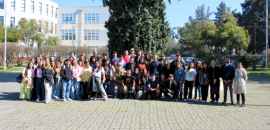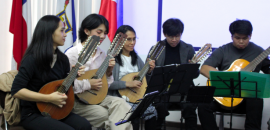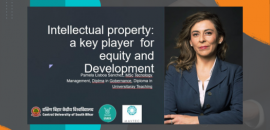You are here
Student from MIT does internship at the Department of Mathematics and Computer Science
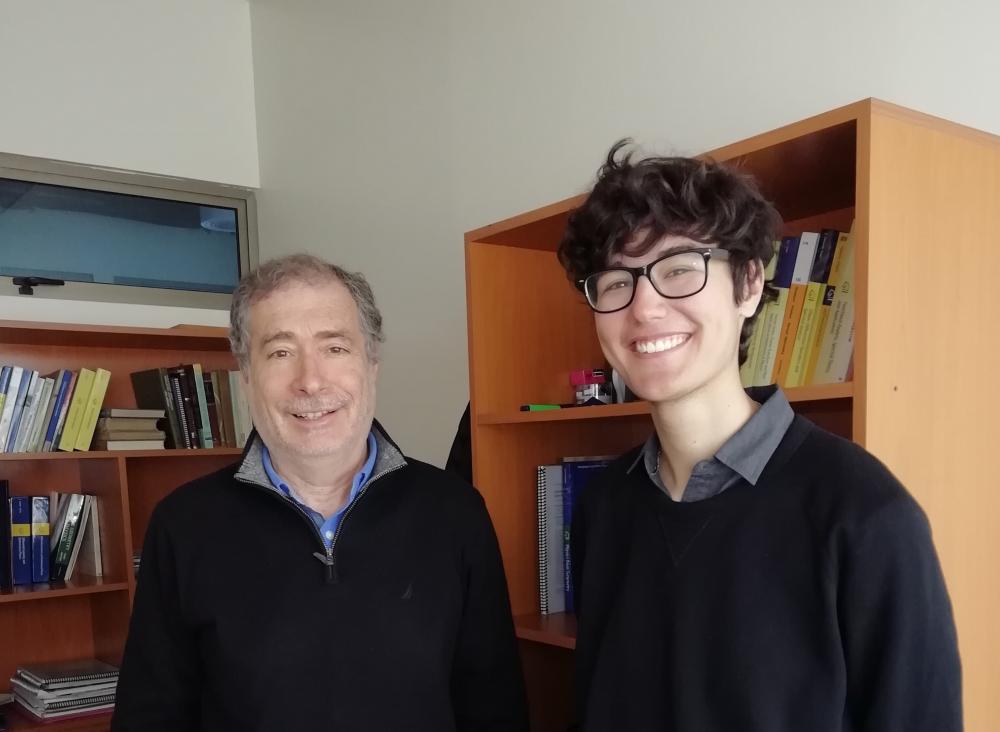
The MISTI-USACH Agreement opens the campus up to international undergraduate students of excellence.
Daniela Guillén, a Mathematics major from the Massachusetts Institute of Technology (MIT) is participating in an 8-week internship on equations, evolution and functional analysis at the Department of Mathematics and Computer Science, along with Professor Humberto Prado of our University’s PhD in Science Program with a Concentration in Mathematics.
This fellowship is framed within the MISTI program (International Science and Technology Initiatives), which looks to create international learning experiences with internships abroad for MIT students. The internships are fully financed, and students in all courses and programs can apply to attend Latin American universities with agreements like USACH during their summer break.
“I chose USACH because it was compatible with the research I wanted to develop, and because the university is more open-minded and less conservative. I wasn’t interested in attending a private university, and I wanted to learn about a different university within the Chilean sphere,” states Daniela.
The student contacted Professor Prado, and they reached an agreement on her internship. “Daniela is interested in the areas that I research, so I designed a directed reading within one of the courses I was teaching this semester on functional analysis, related to the area of physics and mathematics.”
For Professor Prado, the learning capacity of this student profile is fairly advanced, “they study the subjects in just a short amount of time and have academic conditions far superior than average.” Moreover, he adds that the cultural issue is key, “these exchange students’ contact with Chilean students is powerful, because they share their experience in U.S. universities, in this case MIT, and they compare that experience to that of students here. So there’s a cultural enrichment which is fundamental to the development of a society.” Along these lines, Daniela says, “I liked learning the difference about how things work here in terms of grades, since it's very different from in the U.S.”
Daniela and Professor Prado agree that by working together and collaborating with people from different countries, research benefits from the exchange of ideas, which would be optimal for scientific development. The professor adds, “the work with Daniela has had repercussions in our undergraduate and graduate students, in that our students are not so isolate from the world. A 21st-century scientist can no longer live in a bubble, you have to know the society you are immersed in, and what you're going to do has to make sense, whether its education or technology.”
Also in the academic sphere, this internship has allowed Daniela to make new friends. “My classmates have been really nice, they included me in their group, and they’ve taken me to do things like riding up Cerro San Cristobal, going out to eat, and others. I like talking to them about their college experience and how it's different from mine. For example, here they're not used to living in dorms, they keep living at home.”
Culture is also one of the issues that catches the student's attention, since before coming to Chile she had read books by Isabel Allende and had heard the rumor that the Chilean dialect “was difficult.” “I think the linguistic aspect is very interesting, it's really funny. There are words in Spanish that have a completely different meaning here than what I'm used to. Like “po”, “tincar” and even the tone has been completely different for me. But it hasn't been as hard to understand Chileans as they usually tell me.”
When she returns to MIT, one of the things she will have to do is give a presentation on her experience in Chile so that the rest of her classmates can learn more about the country and university, as part of her comprehensive education.
Among her future plans, she wants to continue researching in the area of mathematics and pursue a PhD.
News
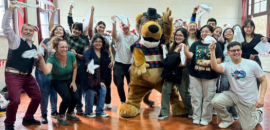 International students learn cueca with Usach Without Borders and Department of Cultures and Arts
International students learn cueca with Usach Without Borders and Department of Cultures and Arts
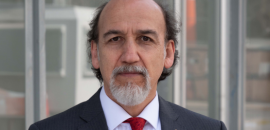 Rector Vidal to join the Governing Board of UNESCO's International Institute for Higher Education
Rector Vidal to join the Governing Board of UNESCO's International Institute for Higher Education
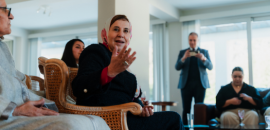 Students visited the Ambassador of Morocco to learn about the country's diplomatic work and culture
Students visited the Ambassador of Morocco to learn about the country's diplomatic work and culture

